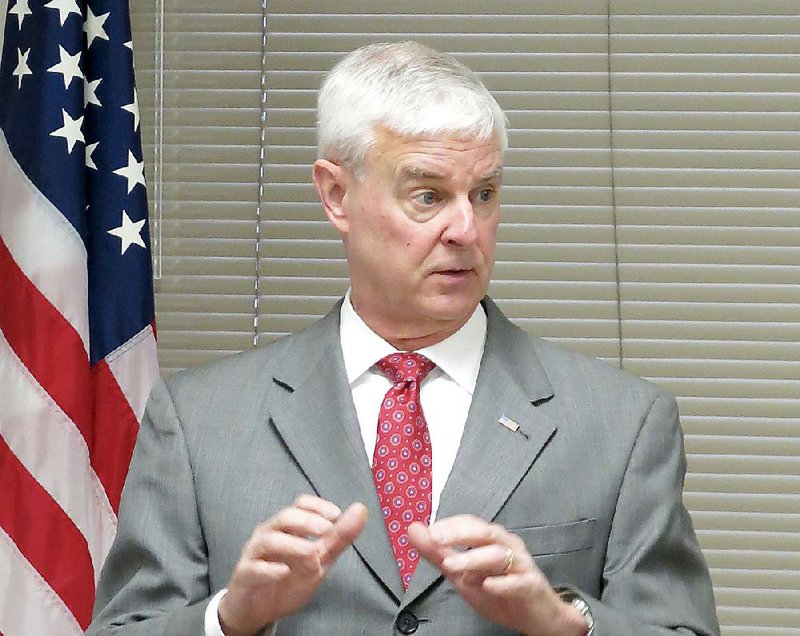WASHINGTON -- The constitutional right to defile an American flag won't last much longer if U.S. Rep. Steve Womack, R-Ark., has his way.
The former Rogers mayor has proposed a one-sentence constitutional amendment declaring: "The Congress shall have power to prohibit the physical desecration of the flag of the United States."
The legislation has 17 co-sponsors, all Republicans, including U.S. Rep. Rick Crawford of Arkansas. The lawmaker from Jonesboro, like Womack, is a veteran of the armed services.
In order to become the 28th amendment, the proposal would need support from a supermajority -- two-thirds -- of both the House and the Senate.
It would then need to be ratified by at least three-fourths of the states: 38 of the 50.
Reader poll
Should Congress have the power to prohibit desecrating the American flag?
- Yes
- No
284 total votes.
A similar resolution has been introduced in the Senate by Steve Daines, R-Mont. It has seven co-sponsors thus far -- all Republicans.
Last month, President Donald Trump called for Congress to approve a constitutional amendment addressing flag desecration.
The issue was back in the news on Independence Day, after a flag burning in front of the White House.
Womack said he'll push for a vote on his resolution during the 116th Congress, which lasts until January 2021.
"I started dealing with this flag amendment back in the 114th Congress," he said. "Just because of the love I have for my country and the symbols that represent our country, I felt like it was important for somebody to stand up and speak up for the most iconic symbol of our country and our freedom. And that's Old Glory."
It's time for Congress and the states to defend the flag "and give it the protections that I think it so rightfully deserves," the retired Arkansas Army National Guard colonel said.
Similar measures have gained approval in the House only to die in the Senate.
Although past attempts to amend the Constitution have failed, Womack said the issue could gain greater prominence if Trump uses his bully pulpit to promote it.
"I think it folds nicely into the 'Make America Great Again' theme," he said, referring to the president's campaign slogan. "I'm more hopeful now than I've been in the past."
In the past, Senate opposition is the only thing that has prevented the amendment from going to the states for ratification.
In 2006, the proposed amendment fell one vote short of passage in the higher chamber.
Arkansas' two U.S. senators at the time split their votes, with Democrat Blanche Lincoln favoring the amendment and Democrat Mark Pryor opposing it.
Since then, the effort has stalled.
"I voted no on the amendment knowing it would be politically unpopular, but my view of serving in the Senate is that I was there to do the right thing and not the popular thing," Pryor said in a text message Friday.
"Oftentimes, emotionally charged issues lead to bad decisions. Think of Japanese internment camps and McCarthyism and the Congressional hearings on the firing of Douglas MacArthur. Note that all of these have a good motivation (i.e., patriotism), but they all involve other American values that could be compromised. I have a conviction here that free speech is sometimes unpopular, but that is the nature of freedom -- American[s] can express themselves even when I might strongly disagree with what they say and do," he said.
Supporters of the proposed constitutional amendment don't object to flag burning per se. It's disrespect that rankles them.
Federal statute -- 4 USC, section 8, paragraph (k) -- explicitly authorizes flag burning, if done "in a dignified way" for the purpose of destroying a flag that is "in such condition that it is no longer a fitting emblem for display."
A federal law, no longer in force, criminalized anyone who "mutilates, defaces, physically defiles, burns, maintains on the floor or ground, or tramples upon any flag of the United States."
But it exempted "any conduct consisting of the disposal of a flag when it has become worn or soiled."
For decades, states had been allowed to punish flag desecrators.
That changed in 1989. That's the year the U.S. Supreme Court struck down the conviction of a Georgia man who had been arrested, five years earlier, after burning a flag outside the Republican National Convention in Dallas.
At the time, Texas law prohibited desecration of "venerated objects," including churches, synagogues, graves and public monuments as well as the U.S. or Texas flag.
After the incineration of the American banner, a Texas jury quickly convicted the culprit, Gregory Lee Johnson, of breaking the law. He was sentenced to a year in prison and fined $2,000.
The ruling was tossed out by a Texas appeals court, which categorized flag burning as constitutionally protected expressive speech.
The nation's high court eventually agreed. Conservative Justices Antonin Scalia and Anthony Kennedy joined the court's three most liberal justices in invalidating the nation's anti-flag-desecration laws.
World War II veteran John Paul Stevens, a liberal justice on many other issues, dissented, as did three of his more conservative colleagues.
Scalia, who expressed nothing but contempt for Johnson, nonetheless saw larger principles at stake.
"If it were up to me, I would put in jail every sandal-wearing, scruffy-bearded weirdo who burns the American flag. But I am not king," Scalia told a Philadelphia audience three months before his death.
Since his conviction was tossed out, Johnson has made a habit of burning flags and continues to get arrested for it, although those who cuff him sometimes live to regret it.
Cleveland officials, who arrested Johnson outside the 2016 Republican National Convention, were slapped with a lawsuit soon thereafter.
Last month, the city reportedly agreed to settle the suit for $225,000.
On Thursday, Johnson again was arrested, this time outside the White House, after setting a flag ablaze on Pennsylvania Avenue on the day of Fourth of July festivities in the nation's capital. Secret Service officials said the arrest came after a flag burning that occurred "outside the limits of a permit that had been issued by the National Park Service."
Video showed flaring flames, a law enforcement official rushing to douse the blaze with a fire extinguisher, and at least one officer leaping out of the way to avoid being burned.
Johnson faces charges of inciting violence, disorderly conduct and violating the fire code, The Washington Post reported. Charges against another protester, who was accused of obstructing law enforcement authorities at the scene, have been dismissed.
No one was charged with flag desecration.
A Section on 07/08/2019

